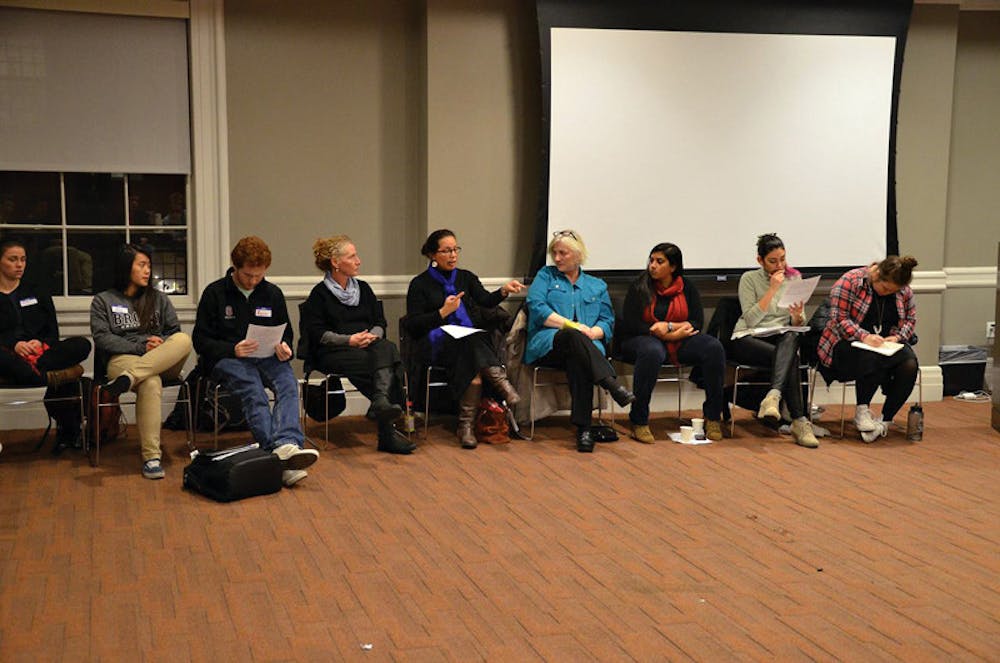Administrators who work on mental health issues addressed student concerns over the University’s leave-taking policies and mental health resources at an open forum Wednesday hosted by the Undergraduate Council of Students.
The guest speakers at the forum were Associate Dean of First-Year and Sophomore Studies and Associate Dean of the College for Health and Personal Issues Carol Cohen, Director of Counseling and Psychological Services Sherri Nelson and Director of Student Support Services in the Office of Student Life Maria Suarez.
After brief introductions, the administrators opened the floor to questions about their respective offices.
Casey Poore ’17, who is not a UCS member but attended the meeting to share her views, noted concerns she has heard from friends about mandatory minimum one-year leaves and the handling of taking leave for psychological versus other medical reasons.
“The recommendation is one full year — that’s a recommendation, not a mandate,” Suarez said in response. An interdisciplinary committee meets twice a year to determine which students on leave will be readmitted to the University, she said, adding that it does “not discriminate between physical leave and mental health leave” and that doing so would be illegal.
“The last mandated medical leave was about two years ago,” Suarez said. “If you are not an imminent risk to yourself or others, we cannot mandate a medical leave.”
Kavya Ramanan ’15, who is also not a UCS member, described her experience taking a medical leave for psychological reasons after her first semester. “For me, going home was not a really healthy place to be,” she said. She applied for readmission after one semester but was not approved to return. Upon her return later, administrators failed to note that her reduced course load was due to psychological reasons, and she wrongly received a warning that she was in poor academic standing, she said.
“No one from Brown really communicated with me that semester,” Ramanan said. “After I came back, the committee said I should see a therapist, and because of various family pressures and cultural pressures … I never did it, and no one checked in on me. I was wondering about communication and dealing with families who might not understand that.”
“We do not have the human resources to reach out to all of you,” Suarez said in response, noting that a temporary employee currently calls students on leave a couple of weeks after they depart campus. “We welcome any time a student is away that they contact us, but it’s hard — I see that as a major deficit on our part,” she said.
Suarez also addressed the topic of requiring students who have taken leaves to attend therapy. “We really would like students who have been on medical leave to come back to the OSL to check in,” she said. “It is rare that we mandate saying you must see a therapist when you return. We recommend it, but then we’re in a pickle because if you can’t or don’t want to, we can’t mandate it.”
Cyrena Gawuga ’03 GS said that as an undergrad, she was given a list of therapists in the area and left to find one on her own, making for “a really dangerous situation” in light of her mental health issues. “I was having to contact people when things were also falling apart,” she said.
“Are there improvements being made in that referral process?” she asked. “Are there going to be increased communications with providers in the community … to ensure that students have actually made some kind of contact and at least initiated that kind of process?”
“We know that it’s difficult for students, and we’re trying to build more of a bridge between our office and providers in the community,” Nelson said in response. “We are trying to improve helping students get that contact, but the improvement is yet to be made.”
Mae Verano ’17, a residential peer leader, said first-years can often perceive the Brown environment as stressful and grapple with mental illness, contrary to their expectations before coming to campus. “The level of rigor and emotional distress are things that students may not have experienced before,” she said.
Verano suggested having a mental health intervention event during orientation to prepare first-years. She also suggested having a panel of students describe their experiences with mental illness. Such an event would help counter the stigma surrounding mental illness “by having students embrace that identity and embrace that experience here and allow the destigmatization of that issue, and raising awareness that these things do happen,” she said.
UCS also approved a resolution at its meeting that categorized 11 student groups. English for Action at Brown and Holistic Health Empowerment of Youth were approved as Category S groups. Qalam, Brown Ragamala, Brownzilian, Universities Aligned for Essential Medicine at Brown, the Brown Association for Master Fishermen and Real Features were approved as Category 1 groups. Design for America and Quest Scholars at Brown were approved as Category 2 groups, and the National Society of Black Engineers was approved as a Category 3 group.

ADVERTISEMENT
More




